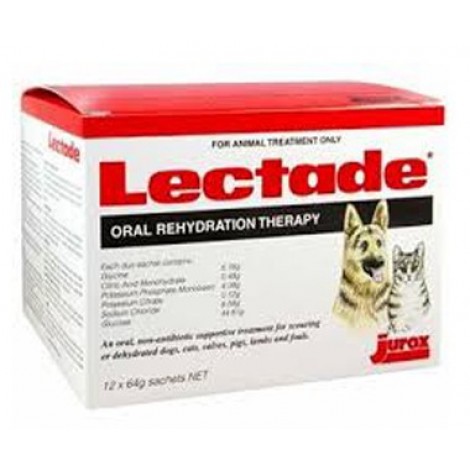Lectade Sachets when reconstituted as directed provide an oral rehydration therapy containing a balanced mixture of glucose, glycine and electrolytes with the added advantage of being a non-antibiotic oral supportive treatment.
- Once diluted Lectade solution is isotonic, ensuring glucose and glycine are actively absorbed by the intestinal tract, causing water and sodium to be absorbed simultaneously with these nutrients and resulting in a high degree of rehydration in scouring and dehydrated animals.
- Where specific disease control (i.e. antibiotic therapy) is indicated, it can be administered in conjunction with Lectade solution.
- Assists with diarrhoea.
- Dehydration (simple or associated with diseases such as canine parvovirus and feline panleucopaenia) post travelling stress and dehydration.
- Post-surgical or disease convalescence.
- Concomitant treatment of viral or bacterial scours.
- Most dogs find Lectade solution palatable and will drink it voluntarily.
- Palatability for cats is variable.
- Lectade solution may also be administered orally via syringe.
Dose:
- For oral treatment only.
- Sections A and B must always be used together when preparing Lectade solution.
- Add the contents of section A and B of one Lectade Sachet to 2 litres (67floz) of warm water, stir until dissolved.
To make 500mls (16.floz) of Lectade Solution:
- Using a 500mls (0.16floz) medicine spoon add 1 level spoonful of section A and 3 heaped spoonfuls of section B to 500mls (16.floz) of warm water, stir until dissolved.
- Store remainder of powder in a dry place.
- Continue treatment for 1 to 2 days after the animal appears clinically recovered and is feeding normally.
Dosage Guide:
Dogs:
- Miniature: 125mls (4.2floz), 2 to 3 times daily.
- Small: 250mls (8.4floz), 2 to 3 times daily.
- Medium: 500mls (16.9floz), 2 to 3 times daily.
- Large: 750mls (25.3floz), 2 to 3 times daily.
Cats:
- 125mls (4.2floz), 2 to 3 times daily.
Foals:
- 1-2 litres (33-67floz), 2 to 3 times daily.
- Give by drenching bottle or stomach tube.
Calves:
- 1 litre/10kgs (33floz) bodyweight daily, divided into 2 or more doses.
- 1.5litre/10kgs (50floz per 22lbs) bodyweight daily initially if dehydration is severe, divided into 3 or more doses.
Scouring Calves:
- As soon as signs of scours are seen withdraw milk or milk replacer and feed the required dose of Lectade Solution for 2 days.
- For the next 2 days return to feeding milk at half the rate and, either separate to or mixed with, an equal amount of prepared Lectade Solution.
- Return to full milk feeding thereafter.
Bought-in or Stressed Calves:
- Feed 2 litres (67floz) of Lectade Solution instead of milk as the first feed on arrival.
- For the next feed use 1litre (33floz) milk or milk replacer mixed with 1 litre (33floz) Lectade Solution.
- Return to full milk feeding thereafter.
- Adequate colostrum must be fed to calves within 48 hours of birth.
Pigs:
- A litter of 1 week old piglets will consume approximately 2-3 litres (67- 101floz) per day.
- A weaner pig will consume approximately 1-2litres (33-67floz) per day.
- Lectade solution should be made available for 4 days.
- If there has been some improvement after 4 days, but the scour has not cleared completely, treatment may be continued for up to 8 days in total.
Suckling Piglets:
- Immediately scour symptoms show, fresh Lectade solution made up as directed should be made available, in a cube drinker or similar clean vessel, to the whole litter.
Weaned Pigs:
- If these pigs are showing signs of scour, make fresh Lectade solution available in a suitable clean vessel, cube drinker, trough or drum with nipple drinker.
Lambs:
- 150mls (5floz) of Lectade solution 3 times daily is a suitable dosage regimen. Lectade solution made up as directed should be administered orally to scouring or dehydrated neonatal lambs by drenching bottle or stomach tube.
| Specifications | |
| For | Dogs/Cats/Horses |
| Active Constituents | Glucose 278.75g, Sodium Chloride 53.44g, Glycine 38.56g, Citric Acid Monohydrate 3.28g, Potassium Phosphate Monobasic 25.53g, Potassium Citrate 0.75g |
| Application | Oral |







